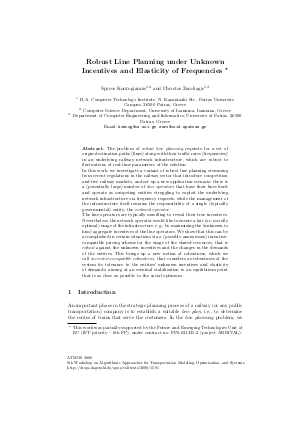Robust Line Planning under Unknown Incentives and Elasticity of Frequencies
Authors Spyros Kontogiannis, Christos Zaroliagis
-
Part of:
Volume:
8th Workshop on Algorithmic Approaches for Transportation Modeling, Optimization, and Systems (ATMOS'08) (ATMOS 2008)
Part of: Series: Open Access Series in Informatics (OASIcs)
Part of: Conference: Symposium on Algorithmic Approaches for Transportation Modelling, Optimization, and Systems (ATMOS) - License:
 Creative Commons Attribution-NonCommercial-NoDerivs 3.0 Unported license
Creative Commons Attribution-NonCommercial-NoDerivs 3.0 Unported license
- Publication Date: 2008-09-24
File

PDF
OASIcs.ATMOS.2008.1581.pdf
- Filesize: 231 kB
- 16 pages
Document Identifiers
Metrics
- Access Statistics
-
Total Accesses (updated on a weekly basis)
0Document
0Metadata
Abstract
The problem of robust line planning requests for a set of origin-destination paths (lines) along with their traffic rates (frequencies) in an underlying railway network infrastructure, which are robust to fluctuations of real-time parameters of the solution. In this work, we investigate a variant of robust line planning stemming from recent regulations in the railway sector that introduce competition and free railway markets, and set up a new application scenario: there is a (potentially large) number of line operators that have their lines fixed and operate as competing entities struggling to exploit the underlying network infrastructure via frequency requests, while the management of the infrastructure itself remains the responsibility of a single (typically governmental) entity, the network operator. The line operators are typically unwilling to reveal their true incentives. Nevertheless, the network operator would like to ensure a fair (or, socially optimal) usage of the infrastructure, e.g., by maximizing the (unknown to him) aggregate incentives of the line operators. We show that this can be accomplished in certain situations via a (possibly anonymous) incentive- compatible pricing scheme for the usage of the shared resources, that is robust against the unknown incentives and the changes in the demands of the entities. This brings up a new notion of robustness, which we call incentive-compatible robustness, that considers as robustness of the system its tolerance to the entities' unknown incentives and elasticity of demands, aiming at an eventual stabilization to an equilibrium point that is as close as possible to the social optimum.
Cite As Get BibTex
Spyros Kontogiannis and Christos Zaroliagis. Robust Line Planning under Unknown Incentives and Elasticity of Frequencies. In 8th Workshop on Algorithmic Approaches for Transportation Modeling, Optimization, and Systems (ATMOS'08). Open Access Series in Informatics (OASIcs), Volume 9, pp. 1-16, Schloss Dagstuhl – Leibniz-Zentrum für Informatik (2008)
https://doi.org/10.4230/OASIcs.ATMOS.2008.1581
BibTex
@InProceedings{kontogiannis_et_al:OASIcs.ATMOS.2008.1581,
author = {Kontogiannis, Spyros and Zaroliagis, Christos},
title = {{Robust Line Planning under Unknown Incentives and Elasticity of Frequencies}},
booktitle = {8th Workshop on Algorithmic Approaches for Transportation Modeling, Optimization, and Systems (ATMOS'08)},
pages = {1--16},
series = {Open Access Series in Informatics (OASIcs)},
ISBN = {978-3-939897-07-1},
ISSN = {2190-6807},
year = {2008},
volume = {9},
editor = {Fischetti, Matteo and Widmayer, Peter},
publisher = {Schloss Dagstuhl -- Leibniz-Zentrum f{\"u}r Informatik},
address = {Dagstuhl, Germany},
URL = {https://drops.dagstuhl.de/entities/document/10.4230/OASIcs.ATMOS.2008.1581},
URN = {urn:nbn:de:0030-drops-15813},
doi = {10.4230/OASIcs.ATMOS.2008.1581},
annote = {Keywords: }
}
